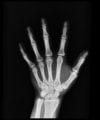The body continually goes through a cycle of bone formation and bone resorption. As bone tissue is broken down and calcium is released, new microstructures are formed to support bone growth. Issues with bone metabolism, such as low bone mineral density (BMD), can lead to osteoporosis and other conditions. Studies have shown that adults with type 1 diabetes often have lower BMD.
A recent study found that individuals with type 1 diabetes may be at risk for decreased BMD compared to individuals without the disease. In a study of 173 children and adolescents with T1D compared to 1,410 non-diabetic peers, there was a significant difference in bone turnover markers in participants with T1D. Researchers looked at three different markers based on BMD measurements and blood samples and found that individuals with T1D had fewer of all three types of markers. However, there was no significant difference between bone turnover markers and diabetes duration, or in BMD levels between the two groups.
According to Dr. Jens Otto Broby Madsen, a physician in the department of pediatrics and adolescent medicine at Herlev Hospital in Denmark, “Decreased bone turnover markers might be the first warning of a negative effect of type 1 diabetes on bone health. Bone turnover markers might be a way of screening for early changes, long before changes can be seen by DXA scans.”
This may help improve health, quality of life, and disease management in the future to decrease risk of other conditions in conjunction with T1D, or at least improve early detection. Diabetes Research Connection (DRC) strives to support novel research studies by providing critical funding to early career scientists to help them move forward with their work. It is these types of efforts that increase understanding about the disease and can improve diagnosis, prevention, treatment, and management of T1D. To learn more about current projects and how to help, visit http://localhost/drc.




